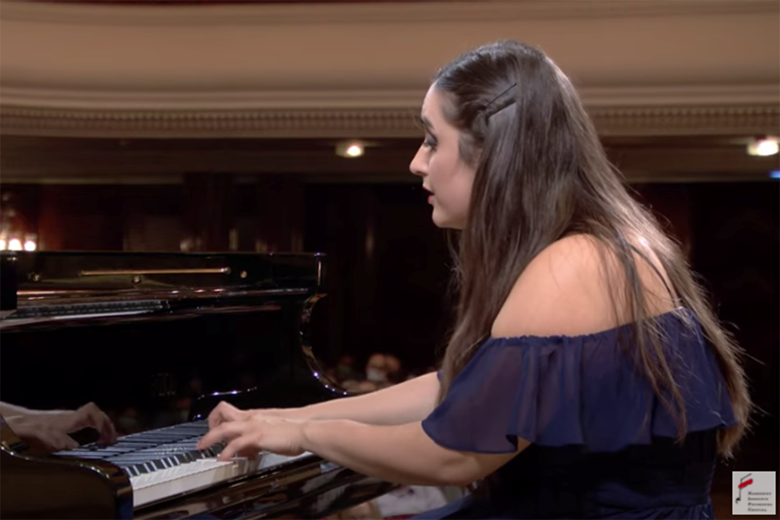The Chopin Piano Competition, day three: settling in
Jed Distler
Wednesday, October 6, 2021

Midway through the Chopin Competition’s first stage, it seems that pianists are progressively acclimatising to the high-pressure circumstances. They’re settling into their music, perhaps worrying a bit less about the intense scrutiny of the jury or an invisible online audience. Then again, having heard the same pieces repeated from segment to segment, maybe my ears are getting tired. Even the most dyed-in-the-wool piano geek can only take so many renditions of Chopin’s arguably overlong F minor Fantasy Op 49.
South Korea’s Hyounglok Choi, today’s second-to-last candidate, played the B major Nocturne Op 62 No 1 perfectly. He took his time with the music, smoothing out the edges and letting the long chains of trills sail gently. The two Études Op 10 No 5 and Op 25 No 5 emerged factory fresh but formulaic, while his Fourth Ballade sounded as majestic as Richter’s and as carefully calibrated as Zimerman’s. So why wasn’t I moved? Why didn’t I infer the slightest sense of surprise? Did the fault lie with Choi, or was my critical stamina simply running on empty?
Noting my similar reactions to Italy’s Federico Gad Crema who concluded the day’s proceedings, I decided I needed a break. A bicycle ride through nearby Riverside Park should help me relax my mind, unstuff my ears and loosen the body. A friend suggested that I fire up some Led Zeppelin over the loudspeakers. Well, maybe Simon and Garfunkel’s ‘Sounds of Silence’!
Refreshed and revived, I rebooted my computer, and went on YouTube, where thankfully the Chopin Institute keep all the performances posted for posterity, and I was able to revisit these recitals. As it happened, my earlier observations remained largely intact, but I enjoyed more of what I heard.
This also held true for the pianists I enthused over at first sight, such as Andrey Zenin, a Russian pianist born in 1995 and now studying in Weimar. He coaxes a rich singing tone from deep in the keys. As a result, melody tends to dominate his interpretations more than harmony or counterpoint. Such an orientation served him better than I expected in the Fourth Ballade, where tempos and transitions were beautifully thought out. Zenin’s gradations in touch imparted a sense of air between the notes, even in rapid passages, such as the ascending left-hand scales leading up to the most shattering climax I’ve heard in this work so far in the competition. The performance had no dead spots whatsoever. Maybe it didn’t equal Talon Smith’s performance yesterday for structural complexity or contrapuntal interest, yet Zenin’s power and authority may well endure better under repeated examination.
Two of the first stage’s older contestants beckoned my attention, but for opposite reasons. The 29-year-old Leonora Armellini’s experience and poise extends to her platform manner, not to mention her complete command of the Fazioli’s responsive action. The piano seems to be a natural extension of her body. This Italian pianist’s arms and fingers move with an elegant economy that produce a liquid sonority and flexible phrasing.
Armellini uncovered nuances in the ubiquitous C minor Nocturne Op 48 No 1 that has eluded other candidates. She brought playful light and shade to the Fourth Scherzo without allowing the dotted rhythms to sag. Her C sharp minor Étude Op 10 No 4 stayed firmly on the rails and retained transparently and clarity despite her breakneck tempo.
The 30-year-old Anastasia Yasko studied at the Moscow Conservatory under the legendary Vera Gornostaeva, and recently released a wonderful CD featuring seldom-heard Soviet piano sonatas by Prokofiev, Feinberg, Sviridov and Weinberg. However, even seasoned contenders have their off days. Yasko began her Chopin round promisingly with a sharply profiled and fluent Op 48 No 2 Nocturne. But sadly her A minor Étude Op 10 No 2 was riddled by persistent memory lapses. Yasko bravely soldiered on through the C sharp minor Scherzo, but clearly her heart was no longer in it – and who could blame her?
Gramophone is a Media Partner of the 18th Chopin Piano Competition - you can follow the competition by watching the live stream at the chopin2020.pl - and visit us every day for more analysis from Jed Distler.











